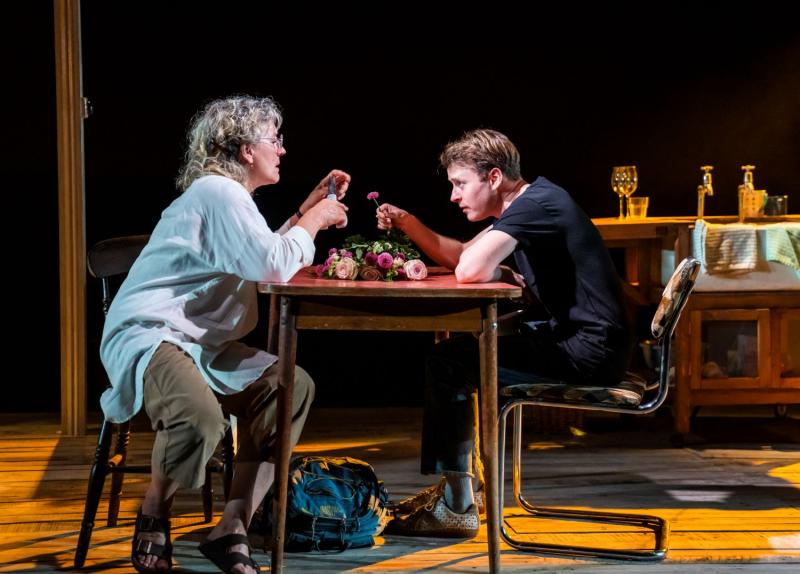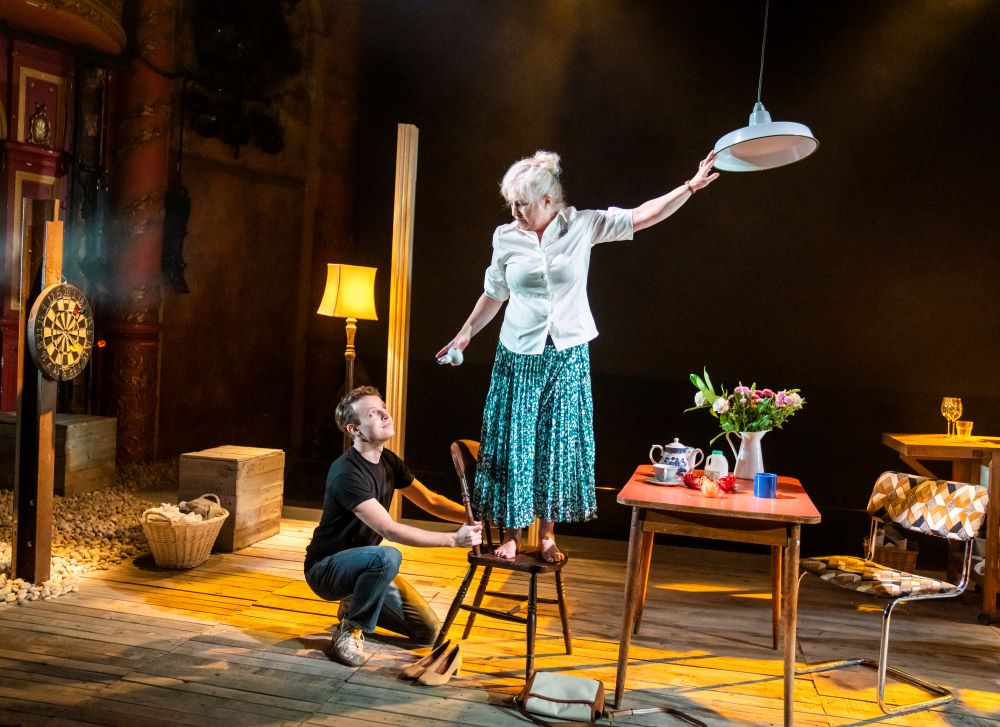The Lodger, Coronet Theatre review - underdeveloped family drama | reviews, news & interviews
The Lodger, Coronet Theatre review - underdeveloped family drama
The Lodger, Coronet Theatre review - underdeveloped family drama
Strong performances and a gorgeous set just about save a lacklustre script

The Coronet Theatre is a beautiful space – it’s a listed Victorian building, and the bar’s like something out of a film about Oscar Wilde.
It’s unclear whether The Lodger wants to be a family drama, or a comedy, or something in between. Esther (Penny Downie) and Dolly (Sylvestra Le Touzel) are sisters, “too close to 70 for comfort”. They grew up in Harrogate; Esther escaped to London as soon as she could, writing novels in Little Venice. Dolly stayed behind and married a rich bore. Neither have children, though Esther has taken in Jude (Matthew Tennyson, pictured below, with Le Touzel), an elusive, painfully earnest 27-year-old, and the lodger of the title. The inciting incident is the death of Esther and Dolly’s mother, which propels Dolly down the M1 and into her sister’s home.  Le Touzel, Downie, and Tennyson have a great rapport, and do their best to make Holman’s strange lines sound like things people would actually say. Le Touzel’s no-nonsense Dolly contrasts with Downie’s brittleness; neither sister is able to maintain her façade (Esther’s of world-weariness, Dolly’s of naivety) around the other. Tennyson, whose brilliant performance in A Monster Calls at the Bristol Old Vic in 2018 was livestreamed over lockdown, uses his wide-eyed, otherworldly quality to great effect.
Le Touzel, Downie, and Tennyson have a great rapport, and do their best to make Holman’s strange lines sound like things people would actually say. Le Touzel’s no-nonsense Dolly contrasts with Downie’s brittleness; neither sister is able to maintain her façade (Esther’s of world-weariness, Dolly’s of naivety) around the other. Tennyson, whose brilliant performance in A Monster Calls at the Bristol Old Vic in 2018 was livestreamed over lockdown, uses his wide-eyed, otherworldly quality to great effect.
Alexander gives us some lovely blocking choices: “I can’t write if anybody else is close by,” Esther sighs, blindly holding out her wineglass for Jude to top it up. Wine is a recurring theme in the first act – everybody’s chucking it around Richard Kent’s gorgeous set, stark white-washed floorboards surrounded by white pebbles. It’s a versatile space, cleverly transformed by just a few changes into the beach at Dungeness, “the only desert in Europe”, where Esther writes her novels. David Plater’s lighting reflects off a large mirrored structure at the back of the stage, bathing the actors’ faces in shifting blue waves.
 Somewhere under the pebbles and beach detritus, there’s a good play. Holman introduces a new character after the interval, Anila (Iniki Mariano, pictured right), who brings a much-needed shot of energy with her. She’s revealed to be Jude’s cousin, and rapidly becomes his love interest. Then, just as rapidly, she’s killed off, just when Mariano was getting into her stride. “She can’t be dead,” says Dolly when she hears. Couldn’t have said it better myself, Doll.
Somewhere under the pebbles and beach detritus, there’s a good play. Holman introduces a new character after the interval, Anila (Iniki Mariano, pictured right), who brings a much-needed shot of energy with her. She’s revealed to be Jude’s cousin, and rapidly becomes his love interest. Then, just as rapidly, she’s killed off, just when Mariano was getting into her stride. “She can’t be dead,” says Dolly when she hears. Couldn’t have said it better myself, Doll.
Holman’s language manages to be direct and obtuse and frustratingly portentous, all at the same time. Jude and Anila refer resolutely to “heroin”, “marijuana”, and “cocaine”, despite allegedly being young people. Occasionally, a good line will break through the fog. “We’re not friends if we’re family,” Anila tells Jude. “That’s a very English thing to say,” he points out, grinning. If only there were more of this.
“It’s beautiful,” Esther says of a play that Jude has written (funny how playwrights always crop up in plays). “It’s full of you.” But exactly who Jude is remains a mystery. The characters spend most of the play telling each other about themselves, as if to make up for their lack of personality, while richer aspects of their inner lives are only teased. Abused in childhood, Jude has OCD and a stammer that reappears when he’s stressed; both of these are mentioned once and never expanded upon. Esther and Dolly’s relationship has potential, but Holman focuses on the men in their lives, and the lack of children, rather than the women themselves. “When people don’t have children, there’s always a story,” announces Dolly. Among the gentlefolk of Harrogate, maybe. But the declarations Holman puts into his characters’ mouths ring hollow, and most of them don’t need to be said at all. At some point, you have to trust your actors to act.
rating
Share this article
The future of Arts Journalism
You can stop theartsdesk.com closing!
We urgently need financing to survive. Our fundraising drive has thus far raised £49,000 but we need to reach £100,000 or we will be forced to close. Please contribute here: https://gofund.me/c3f6033d
And if you can forward this information to anyone who might assist, we’d be grateful.

Subscribe to theartsdesk.com
Thank you for continuing to read our work on theartsdesk.com. For unlimited access to every article in its entirety, including our archive of more than 15,000 pieces, we're asking for £5 per month or £40 per year. We feel it's a very good deal, and hope you do too.
To take a subscription now simply click here.
And if you're looking for that extra gift for a friend or family member, why not treat them to a theartsdesk.com gift subscription?
more Theatre
 Run Sister Run, Arcola Theatre review - emphatic emotions, overwrought production
Chloë Moss’s latest play about the different lives of two sisters is deeply felt
Run Sister Run, Arcola Theatre review - emphatic emotions, overwrought production
Chloë Moss’s latest play about the different lives of two sisters is deeply felt
 Intimate Apparel, Donmar Warehouse review - stirring story of Black survival in 1905 New York
An early Lynn Nottage work gets a superb cast and production
Intimate Apparel, Donmar Warehouse review - stirring story of Black survival in 1905 New York
An early Lynn Nottage work gets a superb cast and production
 Hercules, Theatre Royal Drury Lane review - new Disney stage musical is no 'Lion King'
Big West End crowdpleaser lacks punch and poignancy with join-the-dots plotting and cookie-cutter characters
Hercules, Theatre Royal Drury Lane review - new Disney stage musical is no 'Lion King'
Big West End crowdpleaser lacks punch and poignancy with join-the-dots plotting and cookie-cutter characters
 Showmanism, Hampstead Theatre review - lip-synced investigation of words, theatricality and performance
Technically accomplished production with Dickie Beau never settles into a coherent whole
Showmanism, Hampstead Theatre review - lip-synced investigation of words, theatricality and performance
Technically accomplished production with Dickie Beau never settles into a coherent whole
 4.48 Psychosis, Royal Court review - powerful but déjà vu
Sarah Kane’s groundbreaking play gets a nostalgic anniversary reboot
4.48 Psychosis, Royal Court review - powerful but déjà vu
Sarah Kane’s groundbreaking play gets a nostalgic anniversary reboot
 Joyceana around Bloomsday, Dublin review - flawless adaptations of great dramatic writing
Chapters and scenes from 'Ulysses', 'Dubliners' and a children’s story vividly done
Joyceana around Bloomsday, Dublin review - flawless adaptations of great dramatic writing
Chapters and scenes from 'Ulysses', 'Dubliners' and a children’s story vividly done
 Stereophonic, Duke of York's Theatre review - rich slice of creative life delivered by a 1970s rock band
David Adjmi's clever and compelling hit play gets a crack London cast
Stereophonic, Duke of York's Theatre review - rich slice of creative life delivered by a 1970s rock band
David Adjmi's clever and compelling hit play gets a crack London cast
 North by Northwest, Alexandra Palace review - Hitchcock adaptation fails to fly
Emma Rice's storytelling at fault in misconceived production
North by Northwest, Alexandra Palace review - Hitchcock adaptation fails to fly
Emma Rice's storytelling at fault in misconceived production
 Hamlet Hail to the Thief, RSC, Stratford review - Radiohead mark the Bard's card
An innovative take on a familiar play succeeds far more often than it fails
Hamlet Hail to the Thief, RSC, Stratford review - Radiohead mark the Bard's card
An innovative take on a familiar play succeeds far more often than it fails
 The King of Pangea, King's Head Theatre review - grief and hope, but no connection
Heart and soul proves insufficient in world premiere of therapeutic show
The King of Pangea, King's Head Theatre review - grief and hope, but no connection
Heart and soul proves insufficient in world premiere of therapeutic show
 A Midsummer Night's Dream, Bridge Theatre review - Nick Hytner's hit gender-bender returns refreshed
This Dream is a great night out, especially for Shakespeare first-timers
A Midsummer Night's Dream, Bridge Theatre review - Nick Hytner's hit gender-bender returns refreshed
This Dream is a great night out, especially for Shakespeare first-timers
 Miss Myrtle’s Garden, Bush Theatre review - flowering talent, but needs weeding
New play about loss, love, grief and gardening is humane, but flawed
Miss Myrtle’s Garden, Bush Theatre review - flowering talent, but needs weeding
New play about loss, love, grief and gardening is humane, but flawed

Add comment